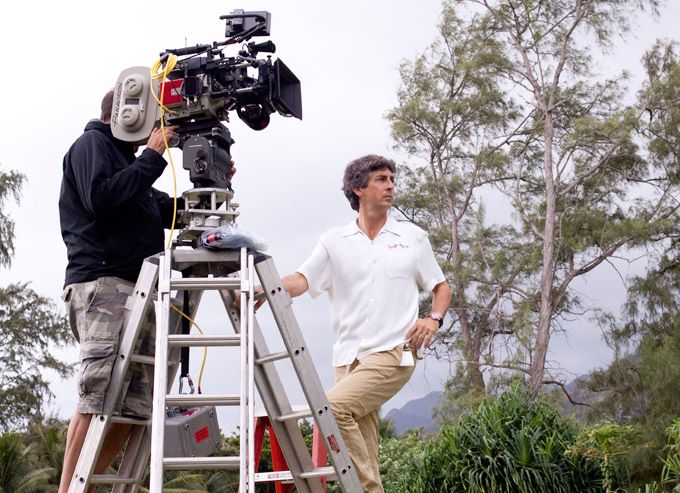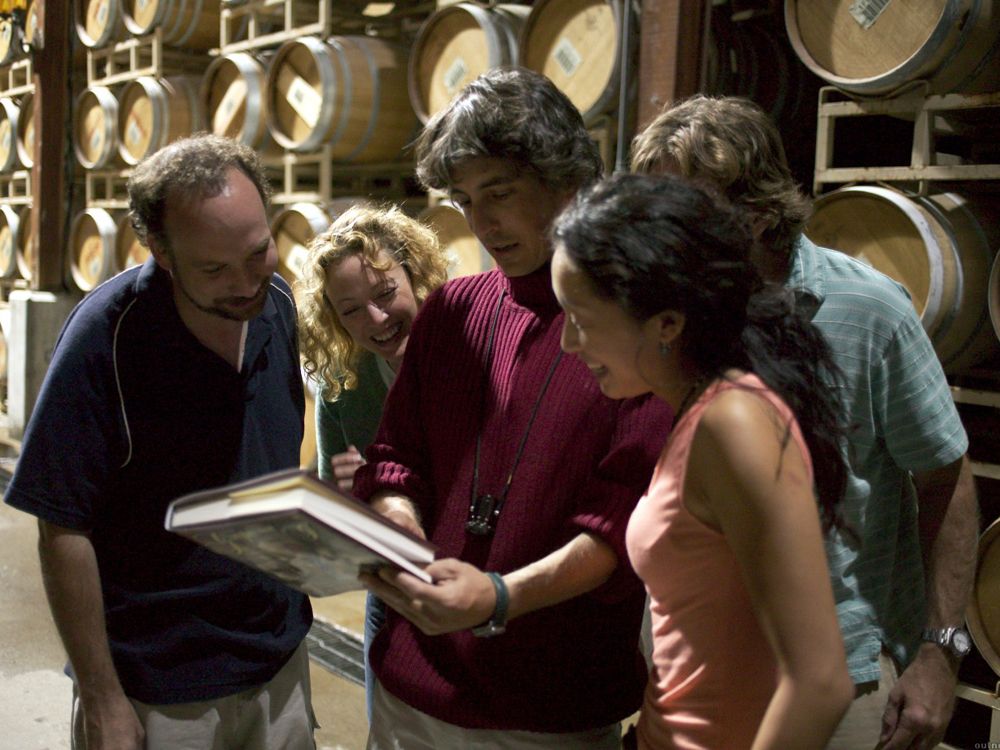“Perfection” is an intangible and massively subjective achievement in art, but if there’s a right balance between humor and buffoonery, emotional resonance and melodrama, Alexander Payne finds it more consistently than just about any other filmmaker in Hollywood.
From his first feature Citizen Ruth to his latest, Nebraska, Payne’s films are filled with ideas that he handles with finesse rather than power, scoring punch lines from sad developments, and finding overwhelming human insights in the silliest of scenarios. Nebraska, about an aging man’s futile journey to retrieve $1 million in likely nonexistent prize money, uses the backdrop of small-town life – and a lifetime of failures and regrets – to lovingly portray familial dysfunction, and more poetically, pay tribute to the American heartland.
Payne spoke with Spinoff Online at the 2013 Savannah Film Festival, where he and star Bruce Dern hosted a screening of Nebraska. In addition to discussing the film’s aesthetic and thematic choices, he talked about his longtime working methods, and reflected on the small, intuitive choices that distinguish his work and make his movies, well, if not perfect, then the closest thing to it.
Spinoff Online: One of the producers mentioned that you were going to make this film a while ago, but postponed it because you didn’t want to make three road movies in a row.
Alexander Payne: Well, two, anyway. This was right after Sideways. I didn’t want to have two guys in a car again after two guys in a car.
How long is the gestation process on each project, or at what point in the completion of one project do you start to think about the next one?
Each time is different. I felt so lucky that right after About Schmidt, I had Sideways to do, and I knew after The Descendants I would jump into Nebraska. I felt so lucky – that’s why those four films came in quick succession, one to the other, and then there was a gap. I don’t know what I’ll do next, exactly. My flag is flying, I’m reading things, but lacking anything good, which I’m not expecting, to be thrown over my transom, then Jim Taylor, my former co-writer, and I will initiate something in January and start writing for four or five months.
How do you distinguish the creative process of working with him from working alone or with others?
I miss him. I mean, he has a great sense of humor, and a good sense of dialogue. I mean, we’re good writing partners. But I love both, actually – I love working with him, and I also enjoy writing alone. I’m happy I wrote The Descendants mostly alone because I needed to find my own personal way into that lead guy, Matt King. It wasn’t my world, that Hawaii world, so I’m kind of happy I did that one alone.
When you undertook this, how much did you think about the metaphorical aspects of the journey that these characters go on? It seems as much about the pursuit of an American Dream that may not be real as this man’s delusional journey to claim a $1 million reward.
Oh, wonderful! But it’s also a journey into his past. For me it was about the guy fixing to die and wanting to go off and die, and the son not wanting him to go. Like, Native Americans or Japanese going over the mountain to die, and his son says, “Let me help you.” But all of those things are in there whether I think of them or not. I don’t have to have thought of them. And I think many people who write stories or do movies or write novels may be vaguely aware of some metaphor, but couldn’t voice it necessarily. It’s up to you to voice it.
Do you think at all about that aspect of storytelling when you decide to write or direct a project?
The first thing, job one, is making sure that on the immediate, literal level, the story works. But if the story has some resonance or has some meaning, it might have those metaphors or symbols or representations that I am aware – I hope that they’re there, but I don’t have to voice them to myself, necessarily. For you it’s different, but for me, it was a little bit about a guy fixing to die. By the end of this film, for me it’s kind of existing on an oneiric, a dreamlike level, where he’s going through a type of birth canal driving down that main street, and it seems literal, but for me it’s not. The public acclaim -- “Hey, Woody! Looking good!” – says goodbye to him, a sense of his enemy, or conflict, perhaps a materialism, waves goodbye, and love waves goodbye, and now he can die. That’s kind of what it does for me, but I don’t necessarily expect anyone else to get that out of it. I’m not even saying I entirely do. They’re just feelings. They’re not so much intellectually expressible thoughts, they’re feelings on my part at the time.
You’ve discussed the reasons for wanting to shoot the film in black and white, but did you have any specific visual references to draw upon?
Not really. I wanted to shoot in black and white, and I knew the comparisons to The Last Picture Show would be inevitable, because of a black-and-white look at a somewhat decrepit, small town. It’s not a huge difference, but the difference being that usually black and white, including [Peter] Bogdanovich’s two pictures, are period films, and this is contemporary – although maybe the black and white invites you to look at now, the present, with eyes as if it is the past on a certain level. No, I wasn’t trying to make a version of anything other than this film. I mean, the D.P. and I watched a number of black-and-white films to develop our language, our film language.
Is it more difficult to figure out that language using digital cameras than it would be with black and white 35mm film?
I don’t think so. Of course, I’m not the D.P. I know how it should look, but we wanted it to look like a movie, so I think you’ll agree it looks like film. We added contrast and grain to make it look like a movie. You can do anything these days. Plus, I care a lot more about film projection than what you shoot on; I don’t really care what you shoot on, but I sure like film projection. Flicker is superior to glow, and we are striking prints, so that’s how I would want to see this, a print of this film.
Your films maintain a remarkable balance of being dramatic without giving in to melodrama, or maybe being comedic but not buffoonish. How easily are you able to find and maintain that balance – is it in the script, or do you find it on set?
It’s all of those things. So it’s just a question of taste – it’s a question of who you are. I personally like to stay on this side of the joke, and keep it real. I’d rather have a certain percentage of the audience miss something than have everyone get it. And I think you have a spectrum of jokes, from the broadest, the naked man chasing Paul Giamatti toward camera, to the subtlest – jokes or plays on words that maybe only five percent of the audience might get, that guy in the corner. But you have to have jokes in the film that only he gets. But just a taste – I prefer my humor the way I like my martinis – d-r-y.
One of the things that resonated with me in the film is how parents of Dern and Squibb’s generation are very tight-lipped about their experiences growing up in a way that we are not. How delicately did you have to handle the details that would be revealed about Woody without simply giving David information where he goes, “Oh, now I understand my dad completely?”
Well, that’s skill in dialogue, isn’t it? The best thing my partner Jim and I ever wrote explaining a background – did you ever see Citizen Ruth?
Yes.
Toward the end they trot out the mother to convince Ruth not to have the abortion, and she says over a p.a. system, “Don’t do it, Ruth! What if I had aborted you?” And she grabs a bullhorn and screams back, “Well then maybe I wouldn’t have had to suck your boyfriend’s cock!” There it’s a big laugh and it tells you oodles about her background at the same time. But, oh, in this movie, it just has little hints – the ex-girlfriend who works at the newspaper office. It’s not like anyone is shedding a huge Klieg light on this guy’s background, but David the son is able to get a few people lighting some matches. And those are interesting – he was kind, he was shot down, he was maybe a little shell-shocked. The mother might say something about her husband. She says, “He couldn’t say no to anyone.” What a dutiful, simple-hearted lunkhead he was, but now we see him and the man barely speaks.
Not to review other people’s reviews of the film, some of the critiques argued that he film denigrates these small-town characters. To you, what’s key in not doing that – or in bringing them to life authentically without making fun of them?
I just try to bring them to life authentically, affectionately and humorously. I mean, I make comedies. And as far as when people say, “Oh, Payne makes fun of his characters,” I cannot control how anyone else reads a text. Often you have to consider the snobbishness of the writer. But for every one of those, I get a bunch more reviews that say “he never makes fun of people,” “has fun without being mean-spirited.” I get that a lot more.
To me, Sideways ends at the exact right moment – when the story is done. How difficult is it for you to know when you’ve gone far enough with your storytelling?
I just know it – where I would end it. And I’m glad you like that. I don’t know how, you just do. Yeah, who knows.
What opportunity to do you feel like you have in mounting adaptations of other people’s work instead of creating something from scratch?
The main one is that a book can suggest a setting and a story that I myself never could have thought of in a million years, and I am then able to parachute into that writer’s world, almost like a documentarian, with my fiction camera, and poke around. Don’t forget that 11 of Kubrick’s 13 features or something like that were adaptations, and they are no less personal for it. He brings himself wherever he goes, and that’s the point – you bring yourself wherever you go.
Are you eager to look at the thematic throughlines of your work?
No. I’m happy for someone to point it out so I can stop being so fucking repetitive, and I want to do brand new things – make films unlike any I’ve made before. I don’t know what that means, but we all have that aspiration, to do something new. But if a good writer can point out thematic throughlines, then maybe that will have served some function that therapy or analysis would have done, except I’m too cheap and too busy to go into that.
Certainly there’s a common idea in many of them of a character stuck in a rut who sort of gets shaken out of complacency.
Yeah, right.
I don’t know that I had a question (laughs).
No, it’s good. We all need reminders, like that book Flatland – somehow if you can be taken out of your two-dimensional world and go into the other dimension a little bit and wake up. We all need to wake up. I root for those characters to wake up in the way I root for myself to wake up.
Nebraska is playing now in select theaters.



